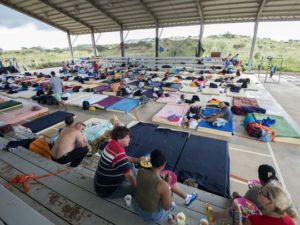
Nicaraguan police forcibly stopped them from crossing the border last month and Guatemalan officials announced last week they would not let the Cubans fly into their country to continue their journey north. Tuesday night, Belize scrapped a planned “air bridge” that would have let the Cubans fly into the country and continue their march.
“Belize got us all excited, then they let us down,” Jaime Aguilera Sierra, one of the stuck Cubans, said in a telephone interview Wednesday. “You can see the reaction on everyone’s faces. Sadness, depression, frustration and all of its synonyms.”
Cubans have long reached the USA by braving the 90-mile journey at sea, riding rickety boats and rafts across the dangerous, shark-infested waters of the Florida Straits. They have braved that trip because the Cuban Adjustment Act allows Cuban immigrants who simply touch U.S. soil to stay and become legal permanent residents.
More Cubans started taking advantage of another route in the past year after the Cuban government eased travel restrictions for its citizens. They can fly to countries such as Ecuador without a visa, so many have flown there to start the long journey to the USA by land, assured of legal entry.
In fiscal year 2014, 17,470 Cuban presented themselves at U.S. land ports along the Mexican border. In 2015, that number nearly doubled to 30,966, according to data from Customs and Border Protection.
There was little to stop the Cubans over the past year, but many of those countries are under U.S. pressure to clamp down on their borders to prevent massive waves of illegal immigration to the USA. That became an imperative last summer, when tens of thousands of children from El Salvador, Honduras and Guatemala flooded the U.S. border, creating a political firestorm in the USA.
Many of those countries hold little sympathy for Cuban migrants because of the specialized treatment they get under U.S. law.
“The question from Central Americans is, ‘So why is it that Cubans have these privileges while Salvadorans and Mexicans have to go back to their country?’ ” said Frank Mora, director of the Latin American and Caribbean Center at Florida International University in Miami. “That creates certain tensions in the region.”
Read the full story at usatoday.com


